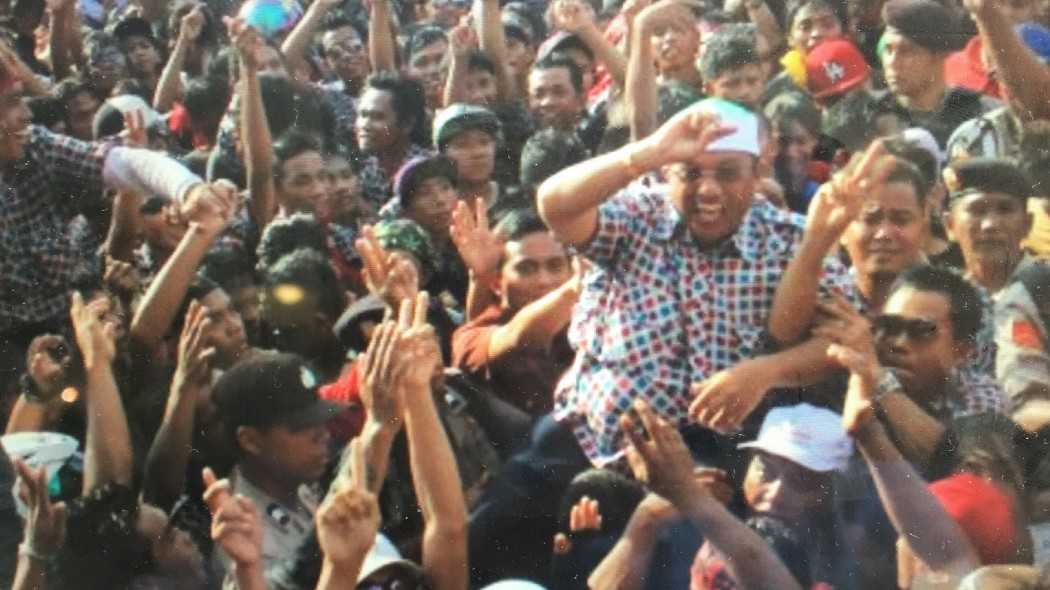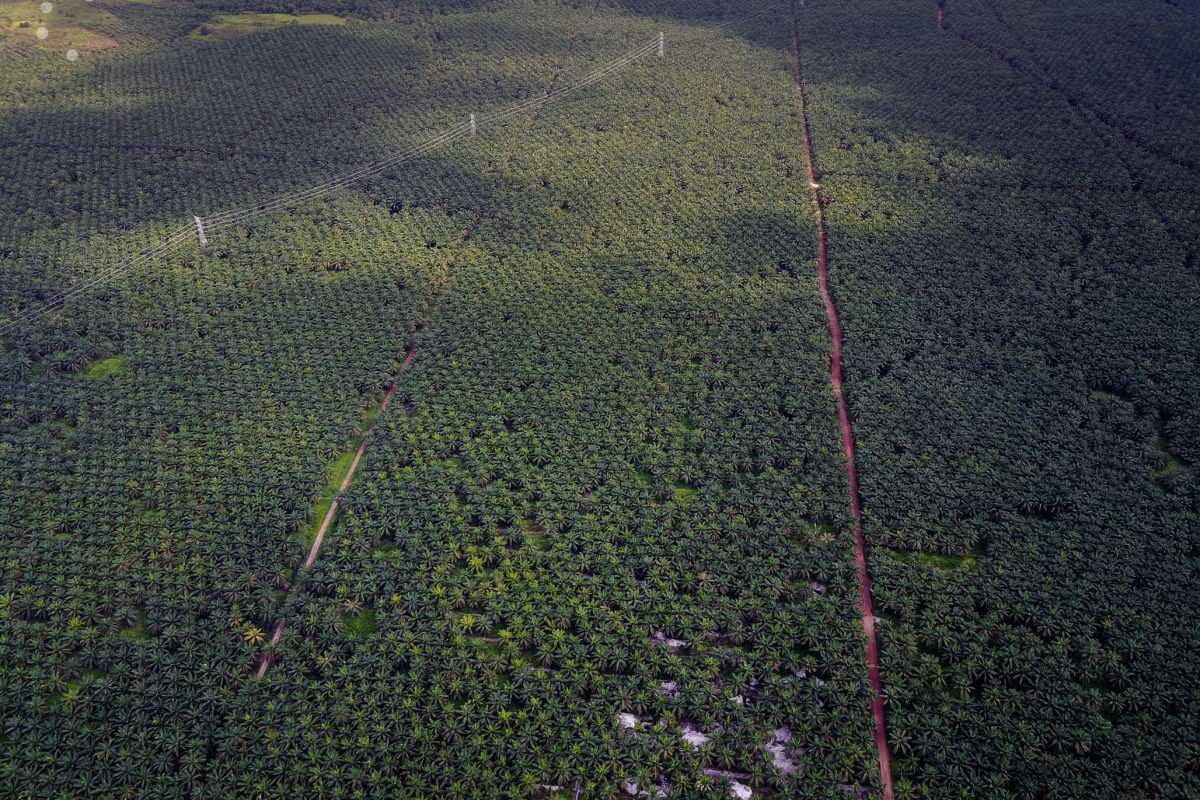- The corrupt sell-off of land and resources by politicians, often to raise money for expensive political campaigns, is a major driver of Indonesia’s deforestation and land rights crisis.
- Some government officials trade business licenses for cash bribes, while others engage in more complex schemes. There is every indication that permit selling in the agribusiness and extractive sectors is rife across Indonesia, even if the true extent remains hidden.
- This article was produced under a collaboration between Mongabay and The Gecko Project, as part of our Indonesia for Sale series.
In June this year, elections will take place in 171 districts, provinces and municipalities across Indonesia. On paper, millions of citizens in the world’s third-largest democracy will be afforded the right to select leaders with extensive powers over their everyday lives. In practice, however, most will be offered a choice between candidates already hopelessly in hock to secretive corporate interests. Many citizens will unknowingly vote for politicians backed by companies that have violated their human rights and caused irrevocable harm to the environment.
The undue influence afforded corporations through campaign financing is a global problem. From fragile states in West Africa to the more mature democracy of the United States, government decision-making is warped by relationships politicians forge with private-sector donors. In the two decades since the beginning of Indonesia’s democratic project, this phenomenon has become entrenched, systemic, and underpins some of the most serious challenges facing the Southeast Asian country.
Recognising how political and corporate interests converge is key to understanding why so little progress has been made toward solving two of Indonesia’s most egregious problems: the destruction of its environment, and the proliferation of conflicts over land and resources. These twin crises appear intractable largely because of the hold that corporations exercise over regional politicians, and the mutually beneficial relationships between them. It begins with elections.
Rise and scale of money politics
Indonesia’s transition to democracy began with the 1998 fall of the military dictator Suharto, who exercised a highly centralised and ruthless control over the country, its politics and its resources. After the regime collapsed and the hegemony of the central government receded, local business and political elites vied to assume control over natural resources worth billions of dollars. The governors, mayors and district chiefs who came to preside over jurisdictions across the archipelago were initially chosen by local legislatures.
The January 2000 election for governor of Central Kalimantan, a forest-rich province on the island of Borneo, is indicative of how these early contests were fought. Rivals to the winning candidate later leaked a list of 31 parliamentarians who had allegedly received traveler’s cheques worth nearly US$12,000 each as an inducement to vote for him. The night before the election, a further $6,000 was reportedly handed out to each of them, and even more went out on election day to those still wavering in their decision. A report by a consortium of local NGOs, cited in an academic paper, claimed that the campaign’s financiers included an illegal-logging baron named Abdul Rasyid, who was then busy extracting timber from a national park in the province.
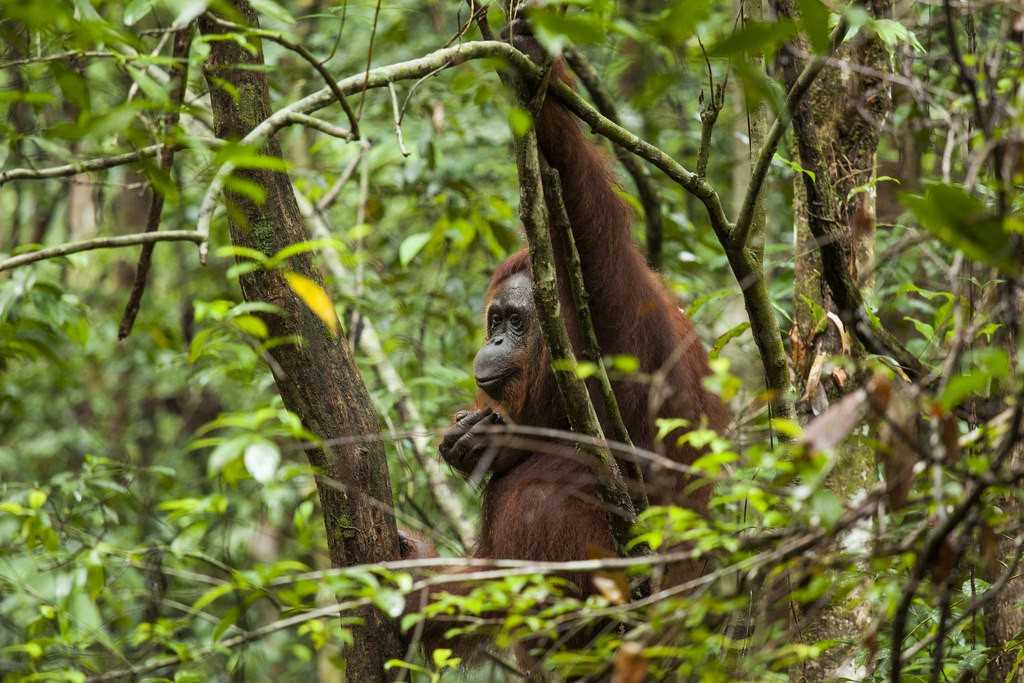
In 2005, the transition to democracy received a turbo boost, with the right to choose regional heads passed to the people through the establishment of direct elections. But any hope that candidates would not be able to buy off entire constituencies, in the way they had with local legislatures, would prove profoundly wrong. Not least because it came on the heels of a dramatic shift of control over land, minerals and other resources from Jakarta down to these regional chief executives. This blew up the value of the rewards on offer to the victors, turning campaign finance into a potentially lucrative investment for corporations and other “entrepreneurs.”
In the 13 years since, political scientists and civil society observers have documented the way elections have been fought, and the critical role of money within them. A 2016 book, “Electoral Dynamics,” profiled the 2014 legislative elections, noting that in the weeks afterward, “the consensus view that developed in the media was that candidates had distributed cash payments to voters, handed out goods, and bribed … officials at levels that had never previously been seen in Indonesia’s electoral history.” The authors of a book to be released later this year, “Democracy for Sale,” write that the “exchange of favors and material benefits at every stage of the electoral cycle is so pervasive that it is apt to think of democracy in Indonesia as being for sale.”
The process involves a range of expensive and prohibited acts. In order to get on the ballot, candidates must secure the backing of political parties representing a fifth of the seats in the local parliament. These parties charge extortionate fees, euphemistically referred to as “dowries,” for their support. Ward Berenschot, co-author of “Democracy for Sale”, estimates the price in resource-rich areas reaches as much as 1 billion rupiah (about $72,000) for each seat a party holds in parliament. In January, a gubernatorial candidate said he was asked to pay 40 billion rupiah ($2.9 million) for one party’s support.
Those who want to evade this system can theoretically stand for office as an independent, but to do so they must first obtain signatures from between 6.5 and 10 percent of registered voters in the constituency, depending on its size. The task is so logistically challenging that few independents make it onto the ballot; in the larger provinces it would entail gathering signatures and copies of ID cards from nearly 800,000 people. Abdon Nababan, one of Indonesia’s foremost indigenous-rights activists, sought to run as an independent in this year’s gubernatorial election in his home province of North Sumatra, but failed to collect enough signatures before the deadline. “If I run through the political party, it’s huge money involved,” Abdon told us. “Because almost all political parties in Indonesia are not really based on ideology. They are based on political transactions.”
A survey of candidates by the KPK, Indonesia’s anti-corruption agency, identified these dowries as the most expensive component of a campaign. Yet some candidates seek to stitch up the backing of all the parties, to close off challengers at this early juncture. This is because a subsequent stage of the process can be just as costly: handing out cash and gifts to voters. Though the amounts per voter are small, the cumulative costs of this illegal practice can be huge.
“You have to do it,” Alfridel Jinu, a former journalist who sought to stand in a 2013 race for chief of a district in Borneo, told us. In his home district, he said, “It’s ‘no money, no vote.’” The winning candidate in that race, Hambit Bintih, who was later jailed for corruption, was alleged to have offered voters up to 300,000 rupiah, then equivalent to $26, for every ballot cast in his favour. In a district with some 60,000 voters, it could have cost him more than $1.5 million. In North Sumatra, where Abdon, the indigenous-rights activist, failed to get on the ballot as an independent, Edy Rahmayadi, a retired military general whose own candidacy for governor is backed by several political parties, was caught on video handing out money at a church before Christmas last year. He denied it was connected to the election, claiming it was just to “help small children.”
The best estimates suggest that the cost of winning a race for district chief is in the millions of dollars. A 2016 study by the KPK placed it between 20 billion rupiah and 30 billion rupiah, or up to US$2.9 million. A former KPK chief told Tempo magazine that a district election in Central Java cost 52 billion rupiah (US$3.8 million); the current home affairs minister has estimated winning a district would cost 75 billion rupiah (US$5.4 million).
There are no caps on expenditure, unless imposed locally, but there are campaign donation limits of 1 billion rupiah (US$72,000) per individual and 4 billion rupiah (US$289,000) per company. The general level of expenditure suggests contributions far outstrip these limits. But “institutional weaknesses and loopholes” in the monitoring regime have led to a situation in which “even the most blatant violations are not investigated”, according to Marcus Mietzner, a professor at Australian National University. One political party, he wrote, spent 100 billion rupiah (US$10.6 million) on TV ads alone in the 2009 legislative elections — double the entire budget it reported to the election monitoring agency. The source of the money remains hidden from authorities and voters.
Candidates often stake their own savings on campaigns, and even go deeply into debt. But few, if any, are rich enough to bankroll a whole campaign. “It’s impossible for them to cover the costs from their own pockets,” Jimly Asshiddiqie, the inaugural chief justice of Indonesia’s Constitutional Court, told us. “It must be from corporate donors.”
Campaign finance and collusion
The KPK interviewed 450 out of almost 800 candidate pairs that took part in the 2015 regional elections. Two-thirds reported that the donors who financed their campaigns demanded something in return: government contracts, jobs, policy influence, and, above all, business licenses, such as those granted for mines and plantations. Mietzner has written that “[s]uccessful candidates for political office … assume their new posts with significant private debt or feel an obligation to serve the interests of their sponsors.”
Where their interests are sufficiently concentrated in one constituency, corporations or family businesses have sought to install one of their own in office; the steady convergence of business and politics arrives at the point where corporations effectively take political office themselves. The current governor of Central Kalimantan, Sugianto Sabran, is a nephew of Abdul Rasyid, the one-time illegal-timber baron. The latter is now a near billionaire, the main source of his wealth a collection of vast oil palm estates.
The governor of Lampung province in Sumatra, Muhammad Ridho Ficardo, is the son of a director of Sugar Group Companies, a major holding group of sugarcane plantations and factories in the province. (“I’m not close to the company,” Ridho said in response to questions about the connection. “It’s my family. No one asks to be born a king.”) The company’s plantation licenses were up for renewal shortly after Ridho’s election in 2014, during which large sacks of sugar emblazoned with his image were distributed to voters, along with cash. Local observers estimated that the election cost up to 500 billion rupiah — around $52 million.
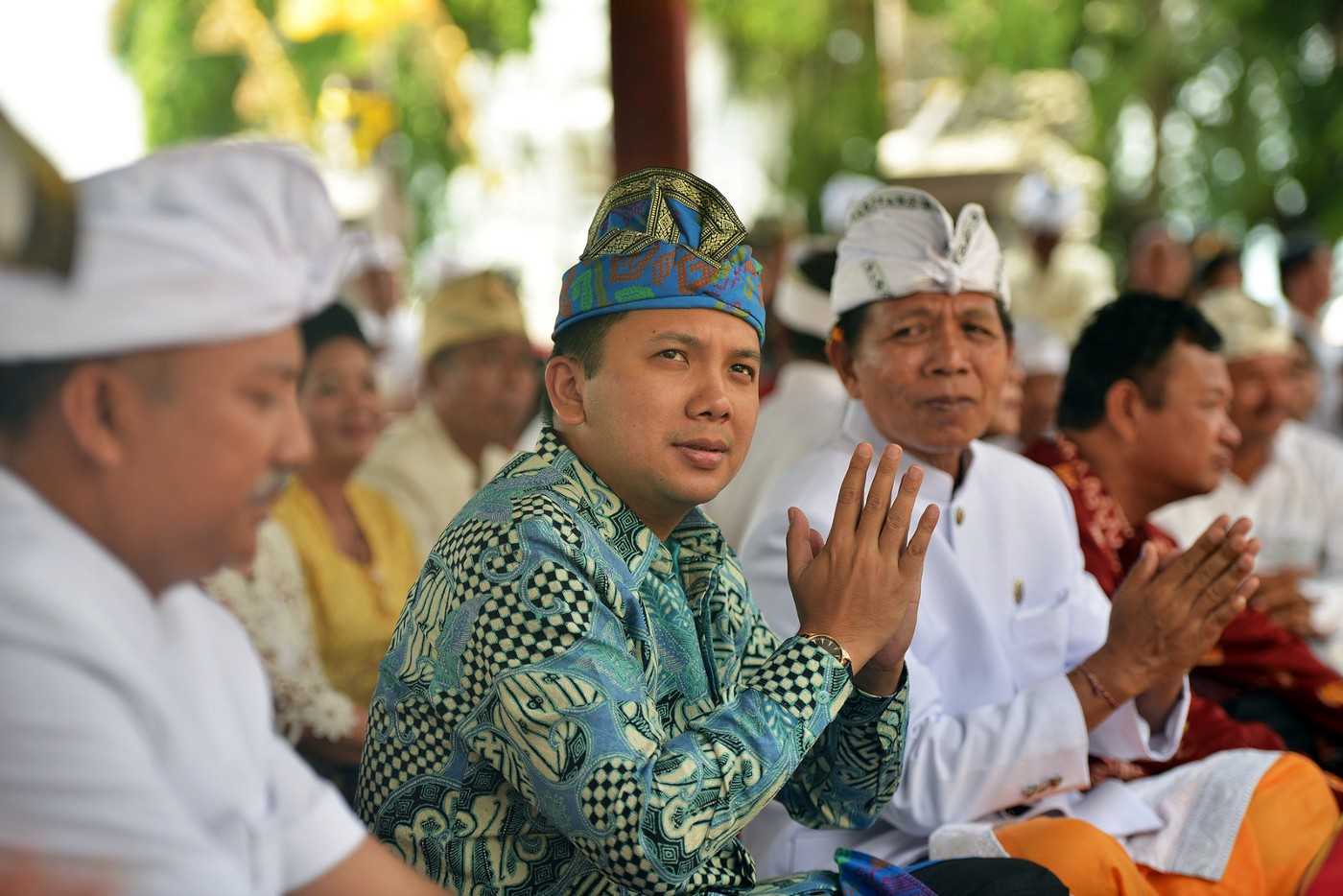
Once in office, there are numerous means by which victors can set about repaying donors and building up a war chest for their next campaign. They can inflate the price of infrastructure projects and give lucrative contracts to companies controlled by their cronies and relatives. The proportion of local budgets dedicated to such projects rose to six times the amount deemed proportionate by the World Bank, according to Mietzner, the ANU professor. They can siphon off money through inflating procurement costs for hospital equipment or oil tankers. Politicians in mineral-rich regions have exploited their control over mining licenses.
For the district chiefs, or bupatis, who assumed control of regions with stagnating economies and little infrastructure, land was perhaps the most valuable commodity they had to offer. Licenses for oil palm plantations in Kalimantan, the Indonesian part of Borneo, commonly sell for between $400 and $1,200 per hectare. The bupatis could issue licenses for thousands of hectares at a time, to whomever they wanted. It is likely no coincidence, then, that the beginning of direct elections and the emergence of mass vote-buying in 2005 were accompanied by a third phenomenon: the palm oil boom. In Kalimantan, the rate of plantation expansion increased fourfold after 2005, to more than 3,750 square kilometers (1,450 square miles) per year.
Corruption, land deals and elections
This expansion has come at a considerable cost. It has fueled the destruction of Indonesia’s rainforests, propelling the nation up the ranks of global carbon emitters. It has plunged thousands of villages into conflict with their neighbors, with the government, and with companies that have annexed their land. Mongabay and The Gecko Project investigated the role of corruption in driving the issuance of permits. In the two cases we have exposed to date, we found a direct link between plantation expansion and electoral corruption, and showed how such corruption lies at the root of deforestation and land conflicts.
In the first case we exposed, a bupati in Borneo issued licenses to 18 shell companies set up by his relatives and cronies. The companies were quickly flipped to two of Indonesia’s biggest palm oil firms for millions of dollars in total. The bupati’s son sold one shell company just three months before his father stood for re-election. The contest was marred by allegations of money politics. In the second case, a bupati’s campaign treasurer sold five companies to a Malaysian palm oil firm in the months before the vote, for a fee eventually rising to $9.2 million. Some of that money appears to have been used to bribe the chief justice of the Constitutional Court to decide the election in their favour.
Both cases provide irrefutable evidence that such corruption plays a singular role in driving both deforestation and land conflicts. In Seruyan, the first district, it dramatically increased the area of land issued to plantation firms and deprived communities from sharing in the economic benefits of the palm oil boom. In Gunung Mas, the second district, the bupati issued licenses within the borders of villages that were already protesting against plantations, and whose forests would have been saved by a politician sensitive to the views of their constituents.
There is every indication that these practices are rife across Indonesia, even if the true extent remains hidden. The KPK has prosecuted bupatis who traded permits for cash bribes; as recently as last October, Rita Widyasari, a district chief from East Kalimantan province, was accused by the KPK of soliciting a 6 billion rupiah (US$434,000) bribe for issuing a plantation license. Meanwhile, Rita’s mother, Dayang Kartini, is the largest shareholder in a separate company that has operated more than a dozen coal mines in the district overseen by her daughter*.* In Ketapang, a district in West Kalimantan, Yasir Ansyari, who was standing to succeed his father, Morkes Effendi, as bupati, is believed to have bankrolled his campaign by selling mining permits attached to shell companies. A bupati in Sumatra, Tengku Azmun Jaffar, used shell companies and family members as proxies to cash in on his power to green-light timber plantations.
Through examining these and other cases, and through interviews with government officials, corporate executives and lawyers, we have identified a number of red flags suggesting that corruption may have taken place. These include the use of shell companies, with no history of trading, as a conduit for selling licenses to genuine investors; permits that are expedited, or issued without legally required preconditions such as environmental impact assessments; a large number of licenses issued to the subsidiaries of a single business group in a short period of time; licenses issued by politicians who were later convicted of other, unrelated corruption offenses; and licenses issued or sold in close proximity to an election campaign.
There may be legitimate reasons in some of these instances, but the probability is that they are indicative of some degree of collusion between politicians, companies and the middlemen who move assets between them. Our analysis of government permit databases and company documents suggests they are rife across the districts targeted most heavily by major palm oil firms.
Some of the most significant threats to Indonesia’s forests that have emerged in recent years betray several of these red flags. Permits to turn 4,800 square kilometers (1,850 square miles) in Aru, a biologically spectacular cluster of islands in eastern Indonesia, into a series of 28 sugarcane plantations were issued by the local bupati, Theddy Tengko, during the five months leading up to the vote in which he hoped to retain his seat. The final permits came through five days before the vote, pushed through without the legally required environmental impact assessments. Theddy was later convicted of embezzling 43 billion rupiah (US$4.5 million) from the district budget.
The palm oil project that currently poses the single biggest threat to Indonesia’s rainforests, in the country’s easternmost Papua province, was signed off by another bupati, Yusak Yaluwo, as he was concurrently embezzling 67 billion rupiah (US$6.5 million) in state funds through a procurement scam, for which he was later jailed. While the project in Aru was defeated by an unprecedented grassroots campaign, the project in Papua continues. No legal action has been taken over either.
A different path
Some local leaders have broken the cycle, running campaigns based on popular policies such as subsidized healthcare, and resisting corporate influence while in office. However, they have tended to break through in urban areas with more mixed economies, where no single interest is quite so overwhelmingly powerful. (An obvious example is President Joko Widodo, who began his political career as a mayor in Central Java before becoming governor of Jakarta). The authors of “Democracy for Sale” make the case that such leaders are far less likely to emerge in places where the economy is concentrated in a small number of sectors, or even in just a single one. These conditions, they suggest, tend to occur in the rural, forested areas where agribusiness and extractive industries are preeminent.
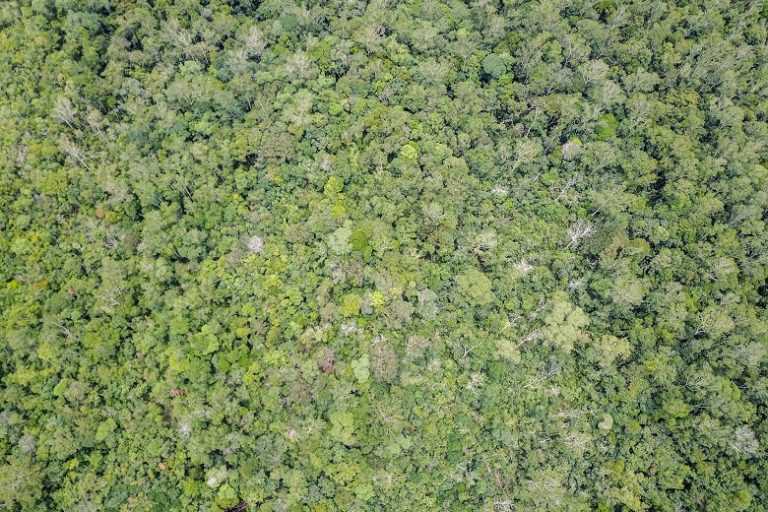
There is some evidence to show that civic-minded candidates can win in such areas, and that those who are willing can take on entrenched corporate interests. For that to occur more broadly, however, will likely require greater interventions by the KPK and civil society to break up the hegemony of “mafia coalitions.” Some recent progressive legal developments that may help that to happen.
While numerous public officials, including more than 70 regional chief executives, have been jailed for graft, to date there has been limited action against the companies on the other end of this corruption. This problem was recognised in a 2016 Supreme Court regulation that could elicit a radical change in enforcement. The regulation removes the legal obstacle the KPK had faced in applying liability to companies, that had allowed many to escape consequences for their proven role in corruption cases. A presidential regulation issued in March this year also requires disclosure of the beneficial owners of corporations, which, on paper, will reduce the ability of politicians to exploit proxies and shell companies. The president is also expected to mandate a review of all oil palm licenses, which could in theory delve into the circumstances in which they were issued.
Our investigations found that the obstacles to enforcement, however, relate not only to the letter of the law. The political pressures faced by the KPK, its capacity and the relevant weight it assigns to perpetrators are equally important. The voices of some in the plantation industry pushing back against any efforts to regulate its excesses are at least as powerful as those in civil society decrying forest destruction and land grabbing. The question is whether, as Indonesia faces overlapping electoral, environmental and social crises, it can afford to allow impunity to continue.
